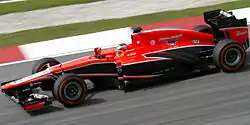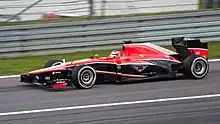Marussia MR02
The Marussia MR02[4] is a Formula One racing car designed under the leadership of Marussia's Technical Director Pat Symonds.[1] It made its competitive debut in the 2013 Formula One season where it was driven by debutant drivers Max Chilton and Jules Bianchi,[7][8] who replaced Luiz Razia, the team's original choice for the seat.[9] The car was launched at the Circuito de Jerez on 5 February, making the MR02 the first car that Marussia (and its predecessor Virgin Racing) has completed in time to start winter testing.[1][10]
 Jules Bianchi driving the MR02 at the 2013 Malaysian Grand Prix | |||||||||||
| Category | Formula One | ||||||||||
|---|---|---|---|---|---|---|---|---|---|---|---|
| Constructor | Marussia | ||||||||||
| Designer(s) | Pat Symonds (Technical Director)[1] Nikolay Fomenko (Engineering Director) John McQuilliam (Chief Designer) Richard Taylor (Head of Aerodynamics) | ||||||||||
| Predecessor | Marussia MR01 | ||||||||||
| Successor | Marussia MR03 | ||||||||||
| Technical specifications[2][3] | |||||||||||
| Chassis | Moulded carbon fibre composite monocoque incorporating front and side impact structures | ||||||||||
| Suspension (front) | Carbon fibre pushrod double wishbone suspension, with Penske dampers | ||||||||||
| Suspension (rear) | Carbon fibre pullrod double wishbone suspension, with Penske dampers | ||||||||||
| Length | 4,995 mm (197 in) | ||||||||||
| Width | 1,800 mm (71 in) | ||||||||||
| Height | 950 mm (37 in) | ||||||||||
| Wheelbase | 3,400 mm (134 in) | ||||||||||
| Engine | Cosworth CA2013K[1][4] 2.4 L (146 cu in) V8 (90°). naturally aspirated, 18,000 RPM limited with Williams Advanced Engineering KERS, mid-mounted. | ||||||||||
| Transmission | Xtrac 1044 sequential semi-automatic 7-speed sport gearbox electronically-controlled paddle shift including reverse | ||||||||||
| Weight | at least 642 kg (1,415 lb) (including driver)[5] | ||||||||||
| Fuel | BP Ultimate 94.25% 102 RON unleaded gasoline + 5.75% biofuel | ||||||||||
| Lubricants | Castrol EDGE | ||||||||||
| Tyres | Pirelli P Zero (dry), Cinturato (wet)[6] BBS Wheels (front and rear): 13" | ||||||||||
| Competition history | |||||||||||
| Notable entrants | Marussia F1 Team | ||||||||||
| Notable drivers | 22. 23. | ||||||||||
| Debut | 2013 Australian Grand Prix | ||||||||||
| Last event | 2013 Brazilian Grand Prix | ||||||||||
| |||||||||||
Design
Technical staff changes
After being suspended from the sport for his role in the race-fixing controversy of 2009,[11] Pat Symonds took on the role of consultant to the Marussia team (then known as Virgin Racing) in 2011. His suspension was lifted at the end of the 2012 season, allowing Symonds to actively participate in the development of the MR02. Under his direction, Marussia abandoned the exclusive use of computational fluid dynamics (CFD)—a method developed by former chief designer Nick Wirth—to develop their car, and instead used conventional techniques such as scale models and wind tunnels, with CFD used to complement rather than dominate the design process.[1] In addition, Marussia formed a technical partnership with McLaren Applied Technologies,[1] the technical development arm of Formula One team McLaren and its parent company, to use their wind tunnel facilities.
Energy recovery systems
The MR02 was the first car built by Marussia to use the Kinetic energy recovery system (KERS) device since the system was reintroduced in 2011.[12] The car used a KERS device designed by Williams F1, based on the design that Williams used when they were a customer of Marussia's engine supplier, Cosworth, in 2011.[4]
Exhaust configuration
The car was launched with a partial Coandă effect exhaust system,[1] the concept of which had been developed by other teams throughout the 2012 season.[13][14][15] The Coandă system uses the curved bodywork of the car to direct the flow of exhaust gases over the rear diffuser, generating increased downforce.[16]
Competition history
The MR02 made its competitive debut at the 2013 Australian Grand Prix. In difficult conditions, Jules Bianchi and Max Chilton qualified in nineteenth and twentieth place, ahead of their closest rivals, the Caterhams drivers Charles Pic and Giedo van der Garde.[17] Bianchi went on to finish the race in fifteenth place, one lap behind eventual winner Kimi Räikkönen. Chilton finished in seventeenth place, two laps behind Räikkönen.[18] At the next race in Malaysia, Bianchi took advantage of a string of retirements to finish thirteenth overall, once again ahead of the Caterham drivers. Chilton went on to finish sixteenth, as the final classified driver.[19]

The car received its first technical updates at the Chinese Grand Prix,[20] where Bianchi and Chilton finished in fifteenth and seventeenth place respectively, once again ahead of the Caterhams. Charles Pic out-qualified and finished ahead of both MR02s in Bahrain, but the team retained their position in the World Constructors' Championship courtesy of Bianchi's thirteenth-place finish in Malaysia.
The team eventually finished a de facto tenth in the Constructors' Championship, with no points but ahead of Caterham due to a better finishing record.
Complete Formula One results
(key) (results in bold indicate pole position; results in italics indicate fastest lap)
| Year | Entrant | Engine | Tyres | Drivers | Grands Prix | Points | WCC | ||||||||||||||||||
|---|---|---|---|---|---|---|---|---|---|---|---|---|---|---|---|---|---|---|---|---|---|---|---|---|---|
| AUS | MAL | CHN | BHR | ESP | MON | CAN | GBR | GER | HUN | BEL | ITA | SIN | KOR | JPN | IND | ABU | USA | BRA | |||||||
| 2013 | Marussia F1 Team | Cosworth CA2013K | P | Jules Bianchi | 15 | 13 | 15 | 19 | 18 | Ret | 17 | 16 | Ret | 16 | 18 | 19 | 18 | 16 | Ret | 18 | 20 | 18 | 17 | 0 | 10th |
| Max Chilton | 17 | 16 | 17 | 20 | 19 | 14 | 19 | 17 | 19 | 17 | 19 | 20 | 17 | 17 | 19 | 17 | 21 | 21 | 19 | ||||||
References
- "MR02 Revealed". marussiaf1team.com. Marussia F1 Team. 5 February 2013. Retrieved 7 February 2013.
- "Marussia MR-02 Technical Specs". Marussia. Archived from the original on 2012-01-09.
- "Marussia MR02 - F1technical.net".
- "Marussia to keep Cosworth in F1 2013". crash.net. Crash Media Group Ltd. Retrieved 7 January 2013.
- "FIA Formula 1 Technical Regulations", formula1.com, Formula One Group, retrieved 7 January 2013
- Noble, Jonathan; Beer, Matt (11 December 2013). "F1 teams expert enough to avoid early tyre struggles – Ross Brawn". Autosport.com. Haymarket Publications. Retrieved 7 January 2013.
- "Jules Bianchi to race". marussiaf1team.com. Marussia F1. 1 March 2013. Archived from the original on March 4, 2013. Retrieved 1 March 2013.
- "To the Max — Max Chilton will make his Formula 1 racing debut with us in 2013". marussiaf1team.com. Marussia F1. 18 December 2012. Archived from the original on December 31, 2012. Retrieved 18 December 2012.
- "Razia Returns". marussiaf1team.com. Marussia F1. 6 February 2013. Archived from the original on October 20, 2014. Retrieved 6 February 2013.
- Collantine, Keith (31 January 2012). "Marussia to launch new car in time for first test". F1 Fanatic. Keith Collantine. Retrieved 31 January 2013.
- Elizalde, Pablo (12 April 2010). "FIA, Briatore reach settlement". autosport.com. Haymarket Publications. Retrieved 7 February 2013.
- Benson, Andrew (23 June 2010). "Changes made to F1". BBC. Retrieved 7 January 2013.
- Beamer, John (28 February 2012). "McLaren's exhaust solution examined". F1 Fanatic. Keith Collantine. Retrieved 7 February 2013.
- Beamer, John (5 July 2012). "How Ferrari solved their exhaust problem". F1 Fanatic. Keith Collantine. Retrieved 7 February 2013.
- "Lotus to bring in Coanda-style exhaust for Korea". Autosport.com. Haymarket Publications. 9 October 2012. Retrieved 7 February 2013.
- "McLaren MP4-27 – exhaust positioning". Formula1.com. Formula One Administration. 14 March 2012. Retrieved 7 February 2013.
The hot air is guided by an assortment of curved surfaces which surround the exhaust [...] as the surfaces curve away from the flow of air, low pressure builds, which in turn forces the air to remain attached to those surfaces.
- Collantine, Keith (16 March 2013). "Australian GP qualifying postponed to Sunday morning". F1 Fanatic. Keith Collantine. Retrieved 20 March 2013.
- "2013 Formula 1 Rolex Australian Grand Prix — Results". Formula1.com. Formula One Administration. 17 March 2013. Archived from the original on March 20, 2013. Retrieved 20 March 2013.
- "2013 Formula 1 Petronas Malaysia Grand Prix — Results". Formula1.com. Formula One Administration. 24 March 2013. Archived from the original on May 4, 2013. Retrieved 30 March 2013.
- Collantine, Keith (8 April 2013). "New parts boost for Marussia in China". F1 Fanatic. Keith Collantine. Retrieved 9 April 2013.